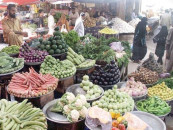NADRA: Sifting out imposters
From ‘posing’ IDPs to corrupt agents, distribution of relief remains problematic for both victims and organisers.

NADRA: Sifting out imposters
At one of the tent villages, set up by the government in Keamari Town where approximately 7,000 people currently reside, only 200 have received Watan Cards so far under the government scheme that launched a month ago. However, NADRA officials present in the area told The Express Tribune on Thursday that they are distributing over 600 Watan Cards daily.
“Our job is to verify the person’s information, including his address and thumbprint. If his NIC has been issued from one of the flood-hit areas as declared by the government, we are bound to process his case and ensure that a Watan Card is issued under his name,” explains Deputy Manager NADRA Mohammad Ikram at a distribution point in Keamari Town.
However, IDPs at the nearby camp complain that most people queuing outside the Watan Card distribution point of NADRA are not actually flood-victims but residents of Karachi – those who migrated to the city from rural areas for better job prospects earlier and continue to possess their old NICs issued from areas such as Larkana, Dadu, Jacobabad, Kamber-Shahdadkot and Thatta among others.
“When I went to get my Watan card, I could barely recognise anyone,” said Mehboob Ali, a resident of Kamber-Shahdadkot and one of the few fortunate IDPs to have received his money. “Most of them seemed to be residents of nearby areas who were here for the money and disappeared once they were handed their debit cards.”
The very vocal Ali claims that he has become acquainted with most families of this tent village over the past two months which is why he is sure that most people receiving the compensation are only ‘posing’ as IDPs.
In his opinion, instead of trying to organise the flood victims each time the government could easily obtain the registration list of IDPs from the revenue officer of each camp and verify their NIC numbers instead of complicating the process further.
Mohammad Khan, who hails from the Khairpur Nathan Shah area in Dadu, concurs. “How many more tokens will the government issue and how many more registration forms do I have to fill to get some compensation?” he asks.
For the past week, the 45-year-old has been following NADRA officials from one point to another in hopes of getting served at some point, only to return empty-handed and disappointed.
“Each time I am told that either my information cannot be verified or that I am asking for money out of my turn and that the bank accounts in Dadu have been blocked for the time being. I don’t understand what is happening,” he says.
In order to avoid confusion, NADRA officials claim that they have divided the flood victims on the basis of their districts. “We are constantly being blamed for mismanagement when we are actually trying to organise all these people,” says Ikram. “For instance, if we decide to issue Watan Cards to IDPs from Dadu and Larkana on a specific day, we will make sure all our officials across various camps in the region are doing the same so we can reach out to all the victims from one area at the same time.” Once a district’s turn is over in two to three days, the debit card does not work. However, in a week or two the card is re-activated.
In come the agents
For many of those who do not understand the procedure, agents are around to help them out. This assistance, however, comes at a cost. Ali says he ‘almost fell into one agent’s trap’ when he demanded a huge amount of Rs5,000 for his ‘services’.
“The agent I met at the Shershah camp [where I got my Watan Card from] led me into believing that I was unable to withdraw my initial amount of Rs20,000 because Nadir Magsi, the local parliamentarian of Kamber-Shahdadkot, had ordered that all our accounts be blocked and that only he (agent) could help me retrieve it.”
But Ali was wise enough to wait a few days before his card was activated again.
Many, however, are willing to pay the amount that varies between Rs500 and Rs5,000 because they are hesitant to head to the ATM alone as they are using a debit card for the first time.
Mian Baksh, a flood-victim of Jacobabad raises a valid point. “We may not have used a debit card, but we can always learn. Why would I pay someone to help me withdraw my money?”
Baksh believes that the so-called IDPs who are ‘able and willing’ to pay agents are those who don’t care about losing Rs5,000. For them, it isn’t a bad bargain because they aren’t IDPs in the first place who deserve this compensation. They are all locals of this city. They are eating away our share,” he bitterly adds.
Published in The Express Tribune, October 20th, 2010.


















COMMENTS
Comments are moderated and generally will be posted if they are on-topic and not abusive.
For more information, please see our Comments FAQ